Jennie Goutet's Blog: A Lady in France, page 22
July 31, 2015
The Trickle-Down Effect of Decluttering
Yesterday I spent hours decluttering my kitchen. I don’t have the before photos to show you because I didn’t go into it with “blog post” in mind, but rather with a determination – born out of desperation – to make some headway in the overwhelm that is currently my life. And I feel better! I do! I think this decluttering thing has a trickle-down effect on the other areas of my life.
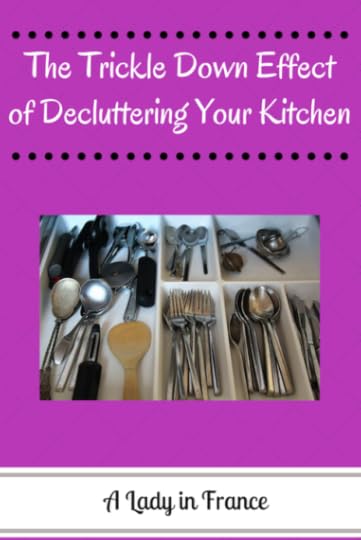
I have the Japanese Kon Mari book on decluttering and I’m really appreciating it. But I found I couldn’t go completely in order. I did my own tops (shirts, sweaters, etc), and that was really helpful. But I couldn’t put my heart into continuing with the rest of my clothes, and then my children’s clothes, and then my husband’s clothes, when the upstairs was so out of control.
I mentioned the rat in the toilet here, right? It’s been going on for 6 months now with only two sightings, but with plenty of splashes to make us aware of his presence. And honestly, it was cute, and small, and not as frightening as one would think (my friends named him Rémy from Ratatouille) – particularly when, for the first few weeks I was in denial about what the splashing could be.
But then. Earlier this week. I was minding my own business, brushing my teeth in the hallway outside the bathroom when some black movement caught the corner of my eye. It was a HUGE rat head approaching the seat of the toilet. And he had approached by stealth because I hadn’t heard any splashing at all. I am not generally a wimp, but I SCREAMED. And then I curled up for two days in a fetal position.
Anyway. Why am I telling you this, apart from giving you a vision to haunt the rest of your live-long days?
There has just been a LOT going on. Kids home, bank administration, government administration, US taxes, RATS waiting to attack vulnerable places… and me – a complete ball of stress. I had to go to the osteopath just to get her to unclench my jaw so I could open my mouth more than half an inch.
I’m doing much better now. The osteo did wonders. The rat guy came – strong ex-fireman. Type you want to do the dirty work. Basically we have to stop the compost until we get rid of the problem, and we need to declutter a bit outside – the tiles and beams of wood that are waiting to be built into a structure. We threw out the bale of straw that was for our garden. He put poison everywhere, including in the two accesses we have to the sewage. I expect this will do the trick, if not this week, at least over time.
So yesterday, my motivation was part “Gross! Rats! I want to throw away everything I own!”; part “The osteopath has saved my life and now I have enough strength to make some headway in this messy house.”; and part “Well. I bought the Kon Mari book. May as well do what it says.”
The broom closet (and where I store breakfast stuff). Matthieu punched nails in the side of the cabinet to hang stuff, and now we can see the floor. I also threw away all my cookbooks but two. I tend to look online anyway.
 The casserole/ frying pan drawer.
The casserole/ frying pan drawer.
 The tupperware drawer.
The tupperware drawer.
 The lazy Susan. I threw away a bunch of old vitamins and fat-burning supplements that I impulse-bought. Stoopid.
The lazy Susan. I threw away a bunch of old vitamins and fat-burning supplements that I impulse-bought. Stoopid.
 Above the sink. The tea is stored in a wooden silverware organiser that makes it easy to pull out and choose what I want.
Above the sink. The tea is stored in a wooden silverware organiser that makes it easy to pull out and choose what I want.
 The dinner + baking ingredients cupboard.
The dinner + baking ingredients cupboard.
 The gluten-free, clean eating cupboard.
The gluten-free, clean eating cupboard.
 The coffee cupboard.
The coffee cupboard.

The baking supplies drawer.
 The baking pans drawer.
The baking pans drawer.
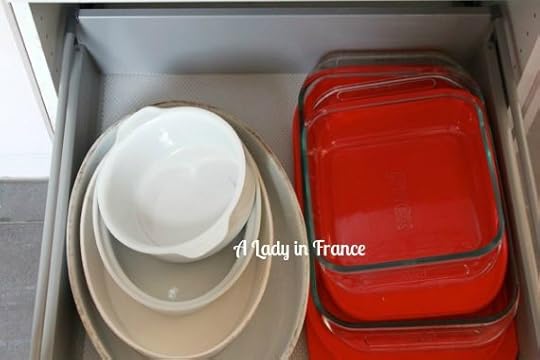 The silverware drawer.
The silverware drawer.
 Now I really wish I took ‘before’ pictures. But I can show you all the stuff I’m throwing away. I’m counting on the fact that gypsies come through to take everything metal when it’s the large-items collection day. In this way it will be recycled well. (Is ‘gypsies’ a non-offensive term? I don’t know where they come from). I’m just glad they can benefit from what I don’t need.
Now I really wish I took ‘before’ pictures. But I can show you all the stuff I’m throwing away. I’m counting on the fact that gypsies come through to take everything metal when it’s the large-items collection day. In this way it will be recycled well. (Is ‘gypsies’ a non-offensive term? I don’t know where they come from). I’m just glad they can benefit from what I don’t need.
 That’s a lot of stuff for a small kitchen, isn’t it?
That’s a lot of stuff for a small kitchen, isn’t it?
And the trickle-down effect is that today I’m feeling really light-hearted. Look! I put on mascara! I wore a delicate necklace that Matthieu gave me. I’m wearing white. All this, and I’m staying home! I have no plans to go out or see anyone. I’m just looking good for me. (And maybe for my husband too). 
July 27, 2015
How to Cut Brie
The extended title reads: How to Cut Brie & Other French Cheese Etiquette. But of course that title was too long and didn’t fit. If you’ve been reading my blog for a veeery long time, you will recognise this post as one that appeared many years ago. It’s such a great tutorial however, and I thought it was time for a redo.
Are you planning to visit France? Eat in a French restaurant? Meet your future French in-laws? There is a certain cheese etiquette that must be followed.

Let’s say you’re going to host a dinner with French cuisine; you’ll want to make sure you start with the proper bread. In the absence of baguettes available, go for the crustiest bread you can find. There should be copious amounts, as it’s eaten throughout the meal, with the salad, and along with the cheese.
It’s fine to put the bread directly on the table. And if you’re amongst close friends and family, you can rip chunks off from the main loaf like this:
If you’re entire being revolts at the thought, cut it in small slices, diagonally like this:
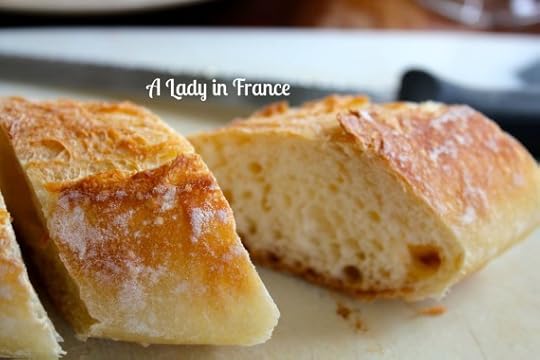
Next, the wine. No matter what wine you’ve had with your meal, you need red with the cheese. Red wine is always served room temperature.
In our alcohol-free house, it’s Bonne Nouvelle. It helps to cut the palate in between bites of cheese (and it contains as much lycophene and a fraction of the calories that normal wine has). I’m afraid I cannot advocate for its superior taste.

Alright. Now on to the cheese. If you are hosting, a proper cheese platter should contain three cheeses minimum: a soft like camembert or brie; a hard like Cantal, Comté or Gruyère; and a chèvre (goat). If you’re going to throw a couple extra in, you can include a pungent blue or Roquefort (not quite the same thing – blue is less sharp), or a surprise, like Saint Nectaire or Reblochon or Tomme de Savoie or Morbier or … well, if you’re in France you have literally hundreds to choose from.
I should add here that the cheese platter is to follow the main meal, not precede it. It is not an appetizer. It also follows the salad course if you have one, and is to be eaten right before dessert. Although restaurants offer the choice between cheese and dessert, a guest in your home will expect both cheese and dessert. Cheeky, huh?
If there was one cheese that had to represent France, it would be the camembert. It stinks up your refrigerator – and your kitchen when you open the door to the fridge; nevertheless it’s here to stay.
Americans tend to eat the milder brie, but camembert is the proper size to serve at the table, whereas rounds of brie are much larger so you have to buy pie-type slices (or serve huge rounds of brie at wedding feasts). It’s interesting to note that most cheeses are named after a region. And although there is a Camembert in Normandy, they didn’t get their act together to protect their cheese label, so now a camembert can be made anywhere. However, people tend to buy the ones labeled, “made in Normandy.”

See that it’s marked lait cru? It means that it’s non-pasteurized and therefore tastes much better (unless you’re pregnant, in which case it tastes just as good, but puts you at risk for lysteria poisoning). Anyway, if you eat non-pasteurized cheese, you won’t get that ammonia taste from the white crust when the cheese starts to get old. It just tastes … better.
You should also know that the hard cheeses are cooked, and are therefore safe to eat while pregnant.
Okay, I bought a brebis cheese instead of a chèvre – (sheep instead of goat). It’s milder, but will fill my chèvre quota for the cheese platter. However, I’ve included a chèvre down below to show you how to cut cheese when it’s in log form.
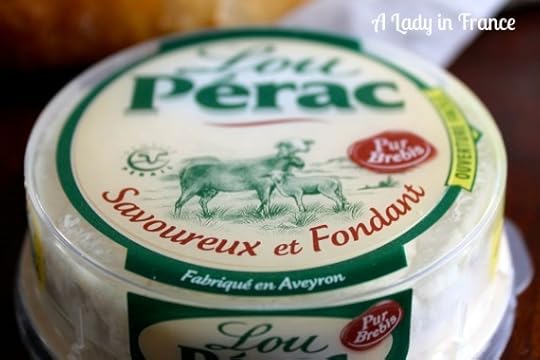
Off to the side, I have brie and Reblochon. They don’t fit on my cheese platter so will have to wait for another dinner. However, I did want to show you how to properly cut brie – (le point principal of this post).

And here is my cheese platter:
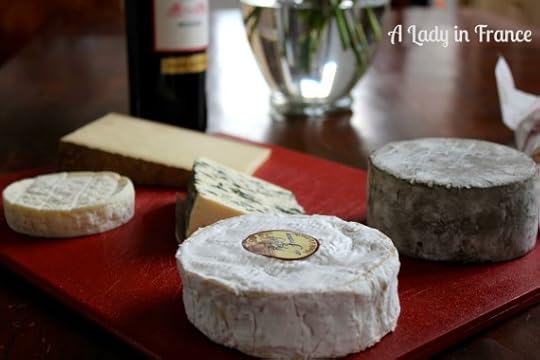
You can see the blue, which is St Agur. The hard cheese is Comté, which is pronounced “con-tay” with a tight little “o” as if it were pronounced by a disapproving old lady.
I put the brebis, the camembert and the Tomme next to the blue and the Comté.
First, the Tomme Grise des Monts.

Gris(e) means grey, and you can see the grey crust here. “Des Monts” means “from the mountains.” You can eat the grey crust on chèvre, which is just ashes, but you can’t eat this hard crust. Tomme is pronounced like tome, and not tome-ay or tommy. There are lots of different types of Tommes.
Now when the cheese is shaped in a round, it’s fairly logical. You cut pie pieces (not too large) and put them on your plate.

Okay this slice is a little large.
The brebis is cut in a similar pie-shaped way.

When it’s shaped like a book – rectangular – you cut the bottom edge off, all the way across. Unless, I should mention, it’s a huge slice of cheese and is too much to cut across. In that case you would cut a triangle off each edge.


When you get towards the back of the cheese with a crust, you want to start cutting it this way:

to avoid the last person being left with …
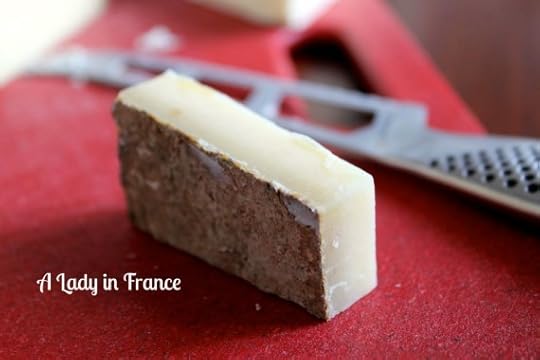
all rind and no cheese. In fact, the whole cheese etiquette comes down to leaving the platter as pretty as you got it.
(And not being a glutton).
Remember the chèvre with ashes (which you eat)? It’s in a log form, so you just cut round slices.

My father-in-law recommends cutting in the middle first and taking slices from there. He said that you can then shove the two ends together and it will keep the centre from drying out. He made sure to clarify that this is not an etiquette tip, just a practical one.

You take your slice and then put the two ends back together.
Going back to your cheese selecting process. When it comes time to take your cheese, pick only 2 or 3 types and take them all at once. Only in informal settings will the cheese platter get passed on to you a second time. Now, if you’re really being a gourmand (because delicious French cheeses are such a rarity for you), take something of everything; but make sure the pieces are as small as you can make them, like this.

Because each piece of cheese has to be eaten on a bite-size piece of bread, and once you cut all your pieces of cheese small enough, that makes a lot of bites. You basically rip a small piece of bread off,

and put your piece of cheese on before popping the whole thing into your mouth (the same way you’re supposed to eat sushi). You should not bite into the bread/cheese and then yank half of it back out of your mouth. It goes in all at once. Here are some examples:



You can see how you might start to fill up quickly.
My brother was at an expensive restaurant for New Year’s Eve in France one year and he shocked a woman by spreading his foie gras on a piece of bread. She spluttered, “It’s not peanut butter!”
So no spreading the cheese either, okay?
Now we get to the relevant point – no matter where you live – because it’s everywhere: the brie.
First of all, you do eat the white crust. If you want to scrape it off a little bit to get rid of the fuzz, you can. But don’t completely remove it because the skin is the best part. See here? All the cream collects close to the skin.

You should cut the slice from either side equally, like this:
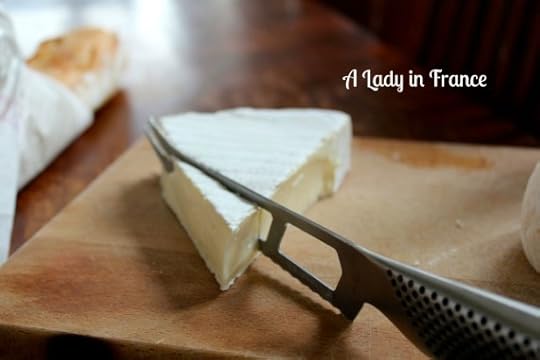
You should never cut it straight across, which is termed “cutting off its nose.”
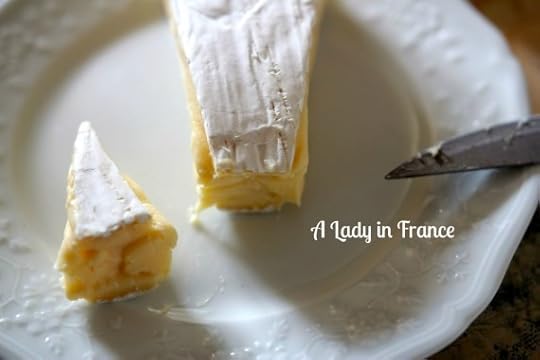
And then (don’t) continue to cut straight across all the way up until the last person just ends up with the crust. That’s considered very rude.

And you should certainly never dig out the soft inside, leaving only the mutilated white crust for the next person,

unless you want that person to look around in disgust and exclaim, “Who cut the cheese?”
The post How to Cut Brie appeared first on A Lady In France.
July 23, 2015
Is There Free Will in Heaven
This week’s question comes from Rachel, who blogs at Simply Rachel, asking if there is free will in heaven. (Rachel’s blog is so extraordinarily lovely, you have to go check it out! You won’t be able to resist staying for awhile). Here is her exact question:
Question: If God cannot be in the presence of sin (and if all in heaven are automatically obedient) and if Angels are obedient servants, how did Satan get cast out of heaven? How did his followers (angels) manage to rebel? To me it seems there was free agency even then? Lastly, the Word states that one day we will judge angels. This leads me to believe that they are not necessarily always obedient, and are capable of mistakes.
Rachel, this was such a difficult question to answer, I started sweating as soon as I read it.  No, seriously. I was glad to have the extra weeks of vacation to dig into the Bible and try to find the most solid answer I could give when there’s such limited Biblical information on the subject. What I came up with is perhaps not an answer, but rather a series of thoughts, based on what I read, to give you something to consider. So here goes.
No, seriously. I was glad to have the extra weeks of vacation to dig into the Bible and try to find the most solid answer I could give when there’s such limited Biblical information on the subject. What I came up with is perhaps not an answer, but rather a series of thoughts, based on what I read, to give you something to consider. So here goes.

Answer. (Sorta): I think it’s important to examine whether heaven was the same back when angels and men first rebelled against God as it will be afterwards when Jesus comes back. Because that’s sort of inherent in the question – they had free will and could rebel back then, so is that what heaven is like? A place where there’s free will? If so, then where does God’s perfection come in?
Right from Creation, God was separating things. He separated light from darkness, heavens from earth, water from land, stars from sun. And you see this concept of separation in his created beings as well, from his angels to the Israelites, his chosen people, to us, the wheat and the chaff that will be threshed on the last day. To separate anything – obedience from rebellion, good from evil – you need to have a process of separation (like distillation, heat, or centrifuge, to use a scientific example), and that’s where free will comes in. That’s what happened in Eden.
The Importance of Eden
It’s easy to confuse Eden with heaven because it was the Garden of Paradise in all its perfection; and when Adam and Eve sinned, they were cast out of the garden and out of God’s presence. But Eden is/was on earth, located between the Tigris and Euphrates rivers. That means that – as far as I can tell – man didn’t sin in heaven at all. He sinned on earth before he was cast out. That also means that, as far as man is concerned, there was never free will in heaven even back then. Heaven is where God is, and it’s where his will is done. Jesus confirms this concept in Matthew 6:
“‘Our Father in heaven,
hallowed be your name,
your kingdom come,
your will be done,
on earth as it is in heaven.”
Eden seemed to be a sort of petri dish of free will to test what would grow out of it, whether rebellion or obedience. It was a way of separating what and whom would remain with God and what would be cast away. How can we know if we are in darkness until we see light? How do we know the character of a man until he has free will to act? How can we know God’s goodness until it’s set against the backdrop of evil?
So God allowed Eden to be a place where choice could be pulled out of mankind. Here was a chance for man to scorn evil and cling to a permanent relationship with God – or not. Man chose sin. Free will allowed God to separate evil from goodness. But what if Eden were a place where choice could be pulled out of the angels as well?
The Fall of Satan and his Angels
I don’t know when Satan fell from heaven, but I wonder if it was following his tempting man to sin. Because look here at the reference to Satan in Ezekiel 28:
“‘You were the seal of perfection,
full of wisdom and perfect in beauty.
You were in Eden,
the garden of God;
You were anointed as a guardian cherub,
for so I ordained you.
You were on the holy mount of God;
you walked among the fiery stones.
You were blameless in your ways
from the day you were created
till wickedness was found in you.
Through your widespread trade
you were filled with violence,
and you sinned.
So I drove you in disgrace from the mount of God,
and I expelled you, guardian cherub,
from among the fiery stones.
Your heart became proud
on account of your beauty,
and you corrupted your wisdom
because of your splendor.
So I threw you to the earth;
(vs 12-18 – I removed some verses that didn’t seem relevant, but you can see the entire thing in Ezekiel 28)
He was a guardian cherub in Eden and he walked freely in God’s presence until wickedness was found in him. Then he got thrown out. I wonder if Satan, the guardian cherub, guarded the entrance between Eden and heaven – the mount of God where he was allowed to walk among the fiery stones. This would have given him ample opportunity to study Adam and Eve, to watch their intimate relationship with God, and decide that they were not as precious as all that. (This is a supposition, not fact, so please bear with me).
Perhaps God allowed Eden, the petri dish of free will, also to be the place where Satan’s wickedness was exposed. Surrounded by God’s perfection in heaven, there was no reason/ opportunity to sin. But here was a chance to get back at God by hurting his innocent children – or not. Satan chose destruction.
Let’s look at his expulsion in Revelations 12:
Then war broke out in heaven. Michael and his angels fought against the dragon, and the dragon and his angels fought back. But he was not strong enough, and they lost their place in heaven. The great dragon was hurled down—that ancient serpent called the devil, or Satan, who leads the whole world astray. He was hurled to the earth, and his angels with him.
Then I heard a loud voice in heaven say:
“Now have come the salvation and the power
and the kingdom of our God,
and the authority of his Messiah.
For the accuser of our brothers and sisters,
who accuses them before our God day and night,
has been hurled down.
Therefore rejoice, you heavens
and you who dwell in them!
But woe to the earth and the sea,
because the devil has gone down to you!
He is filled with fury,
because he knows that his time is short.”
Then the dragon was enraged at the woman and went off to wage war against the rest of her offspring—those who keep God’s commands and hold fast their testimony about Jesus. (vs 7-17, some verses removed)
Before his fall, it seems that Satan was able to go freely between the mount of God and Eden. After he was thrown down from heaven, he went to wage war on mankind, which makes it seem that a) mankind was already in existence, and b) his sin occurred while he was on earth and not in heaven, and c) as soon as wickedness was revealed in him he was cast out of heaven, along with his supporters.
But I don’t think it matters whether or not my supposition is correct. Regardless of when Satan’s fall occurred – and even where – it seems that what spun out of the petri dish of free will was irreversible. Satan and his angels would forever be revealed as having chosen rebellion. God’s angels would forever be revealed as having chosen obedience. And mankind would be forever fallen, were it not for the incredible provision of God’s grace that came through Jesus Christ.
There are a few scriptures that make me think this way about the destiny of angels. Both Peter, one of Jesus’ closest disciples, and Jude (understood to be) one of Jesus’ brothers, said very similar words about angels. In Jude 6 and 9 you see the comparison between Satan and God’s angels:
6: And the angels who did not keep their positions of authority but abandoned their proper dwelling—these he has kept in darkness, bound with everlasting chains for judgment on the great Day.
9: But even the archangel Michael, when he was disputing with the devil about the body of Moses, did not himself dare to condemn him for slander but said, “The Lord rebuke you!”
On the one hand there are the angels who have already rebelled and who await judgement, and on the other hand, there are angels who are so obedient to God they do not act on their own authority. In very similar words, Peter spoke of the latter, and how God’s angels don’t take it upon themselves to retaliate against sinful man. (in 2 Peter 2:10-11)
So I think that was the heaven and earth of before, where free will allowed for rebellion; and for the rebellious, the expulsion was instantaneous and permanent. Let’s look at how this affects us now.
What Will We Really Be Like in Heaven?
Going back to the question: if Angels are obedient servants, how did Satan get cast out of heaven? How did his followers (angels) manage to rebel? I think what Satan and his angels (and God’s angels) chose to do back then forever set the course of their destiny. They’ve already chosen to sin or to obey, so those angels who are still in God’s presence will be obedient forever (because they chose it and because they were created that way and because God sustains them in their destiny). And those angels who chose rebellion were cast out, and will be expelled until Judgement Day. And I think when the scripture says that we will judge angels, it’s referring to Satan and the angels of Jude 6, not God’s servants in heaven.
This sort of brings us to the crux of the matter. What about us? Will we still have free will in heaven? I mean, we have it now. It seems odd to imagine that having eaten of the tree of the knowledge of good and evil that we will then be plunged back into ignorance and perfect obedience. Will we?
When I was praying about this, a vision came to mind. Now I’m no prophet so please just take this as an analogy, not a prophecy. I had a vision that sinning in heaven (as a new creation) would be like putting your head underwater and forcing yourself to breathe in. You just can’t do it. You cannot do something that is so wholly unlike the new, godly nature you will have in heaven.
Earth Is a Furnace & Everything Will Be New
Until I read Isaiah 65:17, I thought that perhaps we would still know what sin was and just choose not to do it, but now I’m not so sure. Isaiah says,
“See, I will create
new heavens and a new earth.
The former things will not be remembered,
nor will they come to mind.”
From this I gather that free will and the desire to sin won’t be an issue when we’re in heaven. What’s sin? What’s rebellion? What’s separation from God? The former things will not even be remembered when there are new heavens and a new earth. (I don’t know what it means by “heavens”). Once our choice is made, God will bring about the perfection necessary for us to remain with him in heaven. He’ll do his work to perfect us and make us like him once we’ve chosen him.
Who are you to judge someone else’s servant? To their own master, servants stand or fall. And they will stand, for the Lord is able to make them stand. Romans 14:4
I can’t see anything in the Bible about angels wrestling with free will after they had made their choice back around the time of Creation. In the same way, I don’t think we will be wrestling forever with free will and obedience to God. The old heaven and earth, (and Eden, the gateway between the two?) was the petri dish for the angels. Earth is the petri dish for us. It’s the dry run. The testing place. The furnace to weed out the chaff and the dross. Once we come through the fire, only the essential will remain: the soul.
In all this you greatly rejoice, though now for a little while you may have had to suffer grief in all kinds of trials. These have come so that the proven genuineness of your faith—of greater worth than gold, which perishes even though refined by fire—may result in praise, glory and honor when Jesus Christ is revealed. (1 Peter 1:6-7) (you can also see the more sobering example of Ezekiel 22:19-21)
There is so much to be found in the scriptures that talks about newness in Christ, and which seems to suggest that we have no idea how different it will be to now. You can look at 2 Corinthians 5:17 and 21, and Ephesians 4:22-24, to name just a few. It seems that now is the time of free will. But once we have made our choice here on earth to pass from death to life (from sin to eternity with Christ), our destiny is beautifully sealed forever.
From these scriptures, I understand that in heaven our very character will be so like God, choosing to do something contrary to that perfect nature will not even enter the mind. The concept of rebellion won’t even brush the sphere of our being. But as a reasoning adult with free will that’s just so very hard for us to imagine – everything about heaven is hard to imagine.
“But you have come to Mount Zion, to the city of the living God, the heavenly Jerusalem. You have come to thousands upon thousands of angels in joyful assembly, to the church of the firstborn, whose names are written in heaven. You have come to God, the Judge of all, to the spirits of the righteous made perfect, to Jesus the mediator of a new covenant, and to the sprinkled blood that speaks a better word than the blood of Abel.
Therefore, since we are receiving a kingdom that cannot be shaken, let us be thankful, and so worship God acceptably with reverence and awe, for our “God is a consuming fire.” Hebrews 12:22-29
* * *
If you have a question for me, you can either leave it in the comments or send me an e-mail. I would love to hear it and try to answer you. Right now there are no questions in queue, so I’ll either take one from you this week or wait until September to start back up again. If you want to learn more about the #sounddoctrine series and my qualifications, click here.
The post Is There Free Will in Heaven appeared first on A Lady In France.
July 22, 2015
My Life Is A Rough Draft
I couldn’t put my finger on why I felt this soul-sucking depression on our way back from Brittany. I thought maybe it was the fact that I needed some alone time after two weeks of collectivity, or maybe that I was frustrated at being told to wait on certain things I was hoping for (told by God, of course, not by man). I thought maybe I was going through my usual bout of post-holiday pressure to catch up and do and do. Or maybe I just wasn’t feeling my best physically and hadn’t had – or made – the time to take care of myself.
But then I realised that no. I was depressed as a result of constantly putting my life and work out there in unfinished, rough draft form when it seems like everyone else is so amazing and … polished.
I should probably back up and explain. Over the past two weeks’ vacation I read three masterpieces: Glass Castles, The Help, and A Thousand Splendid Suns. It had been a long time since I read something that wasn’t either an escape novel, my favourite Georgette Heyer, or a book for review. (I love reading those things too, but this time I wanted to catch up on some of the books I have been meaning to read).
Anyway, these three books, as you know, are just magnificent. Every word is choicely placed, like apples of gold on settings of silver (to borrow from Proverbs). Each sentence is finely-crafted, sparking vivid emotions. The authors thank agents for believing in them, editors for pulling out the best in them, spouses for putting up with their bouts of insecurity. But we don’t see any of those stumbling blocks in the finished work. We see – perfection.
When you blog, you’re constantly putting work out in its rough draft form. It’s the nature of the beast. I don’t mean that it’s riddled with grammatical errors. It shouldn’t be, although I know a few of mine slip through. But when you write a blog post, it’s how you feel and think in that exact moment of time. It’s rare that you go back and change a blog post to reflect how you’ve evolved since you wrote it. Who has time for that? It’s a blog post! And there will be another one coming up tomorrow.
It sort of suits my personality to blog because I churn things out at a dizzying rate, thrive on feedback (if I’m being honest), and am not such a stickler as to choose perfection over speed. I don’t think I’ve even written anything that I now wildly disagree with, but I know that I change all the time; I learn all the time. I’m never exactly the same today as I was yesterday.
So why is this suddenly a problem, and why the depression over it?
Someone criticised a blog post before I left for vacation, and another person criticised a different blog post the day I returned. It’s not that you can’t criticise my work – of course you can! (Although it seems a little unfair to get criticism when I haven’t earned a centime from writing in the past 9 years that hasn’t been immediately sucked back into the blog. I write for free, yo). But those criticisms were valid and could have been avoided had I slowed down to perfect my work before putting it in the public eye. It made me feel sheepish.
And then while in Brittany, I began working on editing my novel. By editing, I mean rewriting, changing things up, polishing. I feel I can do that now that my revised memoir is safe in Emily’s hands. My friend will slash away all the unnecessary words I could not bear to remove.
So I was redoing my novel, but as I read what I wrote, I couldn’t believe I had put these chapters up for public consumption in such raw state. I couldn’t believe I had submitted them to agents hoping for my big break. I forgot that I had blogged the first two-thirds of the book publicly for the sole reason of forcing myself to stick to a deadline with accountability because I had no idea if I could even finish an entire novel. I forgot that this was a rough draft, and not a polished one.
My writing is like the ébauches we saw in the Louvre. Remember? (Pronounced ay-bo-sh, it means ‘rough draft’).

These are Rubens’ preliminary sketches. They were only meant to get him to his finished product, not be the finished product.

The fact that they now sit in the Louvre, even in ébauche form is simply because it’s Rubens. Not everyone is a Rubens.
I published my ébauche of a memoir as if it were in finished form because I didn’t know better at the time. And now I’m abridging my memoir to fall within the normal word count (80-90,000 instead of 130,000). I’ll have a title and cover that looks more like a memoir and less like a Regency novel. I’ll promote it as Christian living, not as travel, even though there’s a lot of travel in there.
But in the meantime, a few hundred copies of my ébauche have been sold, thousands have been downloaded in the Kindle promotions, it’s sat on display in the American Library of Paris, it’s won two (money-making, not prestigious) awards, and has gotten 76 reviews. And all along I want to say – wait! That’s not the one I meant to show you. I can do better!
One of the criticisms on my blog was that I was too categoric when describing the French culture, an error that would not have slipped through if I had treated the post with more consideration. I think I’ve always counted a little too much on your leniency to allow the rough drafts to masquerade as a finished work. But I’ve certainly never presented myself as an expert on any topic, whether it be France or food (except maybe faith at times?) –
Have I?
Suddenly I’m not so sure. And now I’m frozen with thoughts of inadequacy regarding my writing (both blogging and books). I feel foolish and apologetic, and wonder if I will ever produce something magnificent. And this is what has been causing the soul-sucking depression lately.
I remind myself that I needed to self-publish a memoir (that would eventually require an overhaul) in order to prove to myself that I could write one in the first place. I needed to put my romance out there with unbelievable scenarios, overly-descriptive gestures, and stilted dialogue in order to convince myself that I could actually finish it. Okay. So I have a rough draft. Now I need to get to work.
Where blogging is concerned, I suspect that with the rash, overly ambitious, goal-oriented personality I have, I’ll probably always reveal the rough-draft sides of myself before they’ve been brought to a deceitful perfection. I’m sure I’ll keep eagerly presenting my best-effort-books to a yawning audience (I’m not talking about you, dear friends) in hopes that I might be recognised. I’ll probably go through my entire life doing things this same way, knowing me – stumbling over perfection in order to attain “achievement”. It’s a little embarrassing.
There’s a life lesson in all this, isn’t there? I think it’s that no matter how hard we work at filing away the raw edges, our entire life is a rough draft until we get to the end of it. That’s when relationships are polished into a masterpiece – or when they are revealed as a fraud. That’s when all the combined brushstrokes equate perfection, or when the entire sculpture gets lumped back into the clay.
Soul-sucking depression and foolish insecurity be gone. Because it’s a level playing field in the end.

(Since I’m not going to write about it this week, I just wanted to let you know that I’m still plugging away with the ten minutes’ daily exercise. I missed four days in a row at the end of our vacation, but got back on track yesterday and some of the stomach muscles were still there! I’m trying to sort through the exhaustion and prioritise the to-dos. Thank you for those of you who check up on me, and those who let me know your progress. Mwah!)
The post My Life Is A Rough Draft appeared first on A Lady In France.
July 20, 2015
What the French Eat, Part 2
This is Part Two of What the French Eat, based on the dishes our extended family prepares and eats while vacationing in Brittany. For Part One (and lots of additional information, click here).
FRIDAY
LUNCH – Picnic on the beach. Hard-boiled eggs, cherry tomatoes. We had sandwiches on buttered baguettes with salami, slices of Swiss cheese and pickles. We also had chips and Rice Krispie treats (guess who made those).

DINNER – Spaghetti carbonara. Do you know how to make that? I can do a recipe post for you if you like. We also had a cheese platter and a green salad.
SATURDAY
LUNCH – Cooked and quartered potatoes, stir-fried in oil with onions and salt. Hamburger patties. A cheese platter. Fruit salad. And everyone (but me, because of the gluten) had Quatre Quart, which is like a long pound cake with their fruit salad.
DINNER – For dinner we had a tarte à la moutarde, recipe here, plus two quiches (since there were so many of us). The quiche recipe is here. Green salad. A cheese platter. Cream desserts and store-bought chocolate mousse. The store-bought variety is generally very good in France.
SUNDAY
LUNCH – Roast chicken from the butcher. I have a pretty good roast chicken recipe here, which tastes similar to the butcher’s. Ratatouille, recipe here. White rice, followed by a cheese platter and ice cream.
DINNER – Mussels and French fries, recipe here. Green salad. Yoghurt for dessert.

MONDAY
LUNCH – We needed to use up some leftover spaghetti carbonara, so we made that with zucchinis “au gratin”, which means prepared with eggs, cheese and milk as a quiche, and topped with grated Swiss cheese before being baked. Our nuclear family left quickly after that because we wanted to go to Dinard and get ice cream.
Snack: We went out for ice cream and coffee!

DINNER – Crabs (tourteau). The tutorial is here. We ate it with homemade mayonnaise and bread, and a few of us had yoghurt afterwards. Whole crab can be quite filling.
TUESDAY
LUNCH – Tabouli (mine was made with quinoa, but everyone else with couscous). There was also another Lebanese dish that I don’t know the name of. You take two blocks of feta, and mash it with some olive oil. And you add chopped red peppers to that (and maybe a minced scallion?). It was delish. Sausages – chipolata and merguez. Brownies from the Joy of Cooking recipe, topped with vanilla ice cream. (That was mine). Here’s the gluten-free version.
DINNER – Pasta with smoked salmon and caramelised onions. This is another recipe I need to make for you. It was amazing. Green salad. Leftover mussels without the shell, tossed to make a mini salad. Yoghurt.
WEDNESDAY
LUNCH – Roast pork with a sauce made of mustard, green onions, white wine, crème friache, honey and thyme. We had this with potatoes sautéed in butter. Green beans tossed with garlic. Broccoli with butter and salt. There was a cheese platter (of course), and fruit salad.
DINNER – Rice (and leftover tabouli). Gratin aux courgettes – basically scalloped zucchini, similar to what we had for lunch on Monday but without the spaghetti. Cheese platter and cream desserts (yoghurts, chocolate pudding, etc).
THURSDAY
LUNCH – Cold potato salad with olive oil vinaigrette and chives. Leftover homemade mayonnaise. Pickled herring, smoked haddock, and anchovies seasoned in olive oil. Green salad. Ice cream (that needed to be eaten since we were leaving the next day).
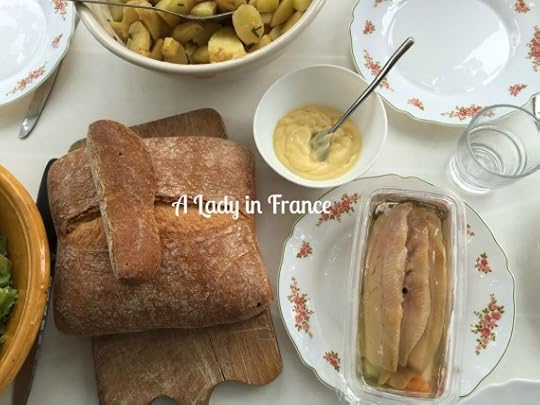
DINNER – Buckwheat galettes. Recipe here. We wanted to take advantage of the Breton specialty for our last night there. Green salad to finish it off. Yoghurt. It seems we ate a little heavier this second week than we did the first. This was not planned.

I hope you enjoyed the virtual foodie tour. Do you think you’ll try any of these dishes at home?
The post What the French Eat, Part 2 appeared first on A Lady In France.
July 16, 2015
How to Cook Mussels
Have you ever wondered how to cook mussels? Here is a mini tutorial, along with a tip.
This is the tip:
(whispers) it’s way easier than you think!
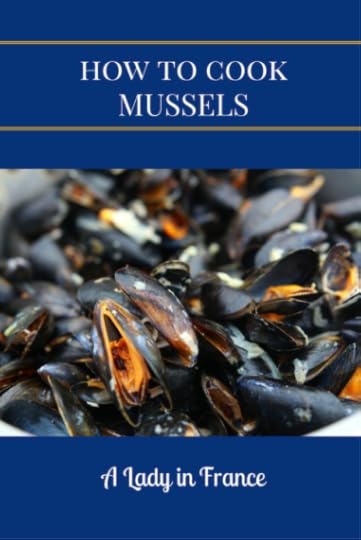
Make sure you buy your mussels cleaned and de-bearded, if possible, but check in any case that they are indeed clean. Rinse them really well, and let them drain as much as possible. It’s inevitable that the sauce will be a bit soupy, but you want it to be as thick as possible.

Then.
You take one crazy French brother-in-law to make you laugh

and another to chop the onions or shallots. (I have four)

(Brothers-in-law, not onions)
And you’re well on your way. Alright let me explain what we did. We made one pot of mussels with onions and cider (the French alcoholic kind, not the Upstate New York apple orchard kind). We made another with shallots, white wine and crème fraiche. The two recipes are pretty similar so you can do either, but I’ll show the latter.
Put the shallots in two tablespoons of olive oil and two tablespoons of butter, and fry them until they soften. We used about a cup of shallots to the 3 kilos (6 lbs) of mussels. (The two different recipes totalled 6 kilos of mussels because there were 20 of us, but that might be a bit much for you.)

When the shallots are soft and have released their flavour, pour about 2 cups of white wine or cider in and let some of the alcohol burn away so there is less liquid. You shouldn’t need salt since mussels come from salt water.

This is what the cider looks like for the onion recipe.
When your mussels are properly cleaned and drained, pour them in.

Keep the heat on high and stir them often. When the mussels open, they are done. It takes around ten minutes, depending on how many mussels you have. While the mussels are still hot, add a cup of sour cream or crème fraiche and stir that in too. That way when you soak up the sauce on your plate with a piece of baguette you get a taste of all its creamy-seafoody deliciousness.

My family usually makes this au pif. (They eyeball the measurements).
You can do that too. You’re not likely to go wrong.
Now. What do you serve mussels with?
 French fries!!
French fries!!
 And beer, cider or white wine.
And beer, cider or white wine.
You all know I don’t drink, and if I were making this at home, I would have made it with alcohol-free white wine and it would have tasted just as good.
So once you get your mussels and fries on your plate, you need to clean out one of the mussels like this.
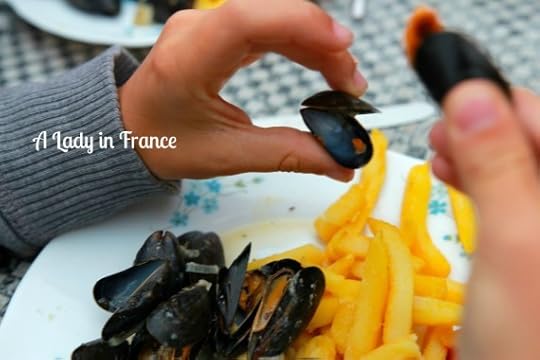
And that becomes your tool to get all the other mussels out.
Like this:
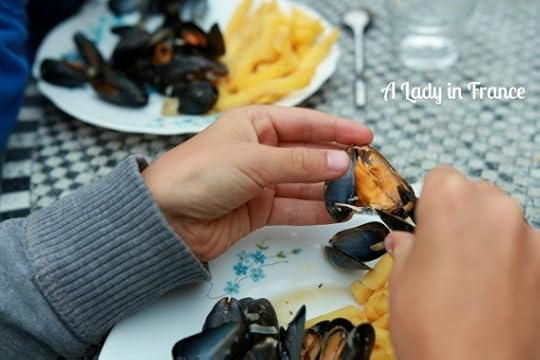 and like this.
and like this.
 Fun, huh?
Fun, huh?
Mussels with Wine and Shallots Print Prep time 15 mins Cook time 20 mins Total time 35 mins From: Lady Jennie Recipe type: Seafood Cuisine: French Serves: 6-8 Ingredients 3 Kilos mussels (6 lbs) 2 cups white wine or cider 1 cup shallots 1 cup crème fraiche 2 T olive oil 2 T butter Instructions Clean the mussels and drain them well. Sauté the shallots in the olive oil and garlic. Pour the wine in and let it reduce. Pour the mussels in and stir them over high heat in the sauce until they open - about 10 minutes. Add the crème fraiche. Eat them with french fries and baguette. And salad if you're being reasonable. 3.3.3077
The post How to Cook Mussels appeared first on A Lady In France.
July 12, 2015
What the French Eat
This is Part One of What the French Eat, based on the dishes our extended family prepares and eats while vacationing in Brittany.
Breakfast is always slices of bread from the bakery with a generous slather of butter (salted or sweet), topped with honey or jam, and a bowl of black coffee, or café au lait. Yes, a bowl.
I chip in and fix some of the other meals and snacks, which means that sometimes a few American things slip in, like Rice Krispie Treats or homemade brownies. But for the most part, these are ordinary family meals, traditionally French, and prepared by some pretty good cooks.
Snack: The French tend to have a 4:00 coffee or snack because we eat lunch at one and dinner at eight. The kids just can’t last that long, and sometimes neither can the adults. The kids have cookies and fruit, or a baguette with a row of chocolate squares shoved in the soft interior. The adults have a black espresso with a square of chocolate, or sometimes fruit. Very occasionally there will be a pastry or homemade cake.
You might be surprised at how unglamorous the French meals are at times. I’ve lived with four French families over the years, all of them very traditional, and none of them were adverse to frozen pizza or canned vegetables. But the meals are surprisingly simple too, with lots of fresh ingredients. And I hope this week’s menu will give you some good ideas for your own meals. (Obviously these dishes are all geared towards summer, which makes me think I should do a winter one too).

WEEK ONE
FRIDAY:
Dinner. Radish soup. This is made with radish leaves, a potato and a leek. You boil it until it’s soft and purées well, and add a scoop of crème fraiche (sour cream) to each bowl. Warm potato salad with sautéed shallots, Dijon mustard dressing, and hotdogs that were cooked and cut into pieces, then added. Cheese platter, followed by the Apricots we brought from our garden.

SATURDAY:
Lunch. Chiopolatas (sausages) fried in a pan. Rice sautéed with onions. Salad with homemade vinaigrette. Cheese platter & bread. * (There’s always bread. When we’re this big in number, we tend to buy big squares of bread – pavé de pain – instead of baguettes, unless we’re eating a picnic). Fruit salad.
* I’m going to be updating this old post soon, but for what constitutes a French cheese platter, and the etiquette that goes with it, you can take a look here.
Dinner. Cold gazpacho (store-bought), followed by a casual dinner of Dried sausage and Homemade pepper terrine (this is pâté). Cheese selection. Hardboiled eggs, split in half with a drizzle of mayonnaise. A salad composée of cucumbers, tomatoes, cauliflower, and feta cheese, tossed in vinaigrette. We also had an apricot flan – like a clafoutis but without the flour. We needed to use up some of our apricots.

SUNDAY:
Lunch. Roast, seasoned chicken bought from the butcher. Frozen mixed vegetables with mushrooms, sautéed in olive oil. Stir-fried zucchini. Green beans with salt and butter. Cheese platter with bread. The French don’t always need another starch apart from bread. They’re perfectly happy with a meal of meat and vegetables on the side. Ice cream – the mini Magnums on a wooden stick.
Dinner. Pasta with butter, topped with Swiss & Parmesan cheese. Slices of rolled ham from the butcher. Terrine (pâté). Green salad. Yoghurt selection. There was no cheese platter because there was a lot of pasta.
MONDAY:
Lunch. Fried hamburger patties, prepared by the butcher. Almost everyone asked for them rare, including the kids. Canned peas. Cheese platter. Fruit selection. (We were grocery shopping until 12:30 so we settled on a quick lunch).
Dinner. Rice. Halibut fried with lemon and butter. Broccoli. Cream dessert selection (yoghurt – or chocolate, coffee, vanilla puddings and mousses).

TUESDAY:
Lunch. Warm potato salad with the leftover roast chicken and ham cut into pieces, seasoned with shallots and pickles. For the 20 of us, we made ten pounds of potatoes and pretty much ate it all. Cheese selection. Salad. Homemade apple tart, similar to this recipe, except without the jam and honey. My mother-in-law just sprinkled cinnamon and sugar over the top.
Dinner. Mutton with garlic cloves punched into it, sprinkled with thyme, salt and pepper. Like this recipe! It was supposed to be lamb, but it was cheap and we found out why once we bit into it. Mutton is older and has a much stronger taste. With that we had Ratatouille, recipe here. We also had the rest of the Rice, stir-fried with a shallot. And Dessert was a selection of yoghurt and mousse.

There is never any ratatouille left when we make it.
WEDNESDAY:
Lunch. Picnic-style lunch with baguettes and ham, dried sausage and a cheese selection. There were tomato wedges and we had a warm green bean salad with shallots and vinaigrette. Dessert was homemade chocolate mousse, similar to this recipe but without the red pepper.
Dinner. Pasta bolognaise – the sauce simmered for over an hour in a big pot with a bouquet garni (and so therefore had a hint of thyme). This was so filling, we just followed it with yoghurt and had no cheese.
THURSDAY:
Lunch. Rice with a tarragon chicken sauce, recipe here. We also salted cucumber slices, drained them in water, and mixed them with a Dijon-cream vinaigrette sauce to make a cucumber salad. We had Peaches for dessert.
Dinner. Buckwheat galettes, recipe here. That’s what the family had at home. And it so happened that it was the evening Matthieu and I went to Saint Malo on a date and ate buckwheat galettes there too. We drank mint and lemon Diabolos. (Mint syrup and lemon syrup mixed with sparkling water as two separate drinks – I had the lemon).

The ones at home were pretty traditional with eggs, ham, tomato and cheese. The ones we ate at the restaurant had things like camembert and applesauce, scallops in a butter-garlic-parsley sauce, sardine paste with crème fraiche, and chorizo, tomato and cheese. We really shouldn’t have with all that butter in the galettes, but we also had gelatto for dessert. Slurp.

And those were our meals for the first week. There is a lot that goes into the decision-making process. Some were simple because we were out of groceries (no surprise with 20 people) and we needed a quick meal after the grocery run. Others were simple because we returned from the beach late with eleven hungry kids in tow.

What made it decidedly French was the cheese platter at almost every meal (unless the main course was really heavy), and the green salad with homemade vinaigrette* that was almost always served after the main course. The salad is always very fresh, and it’s always just green lettuce and dressing, unless it’s a “salad composée” with a mixture of things.
* You can get the recipe for Dijon mustard dressing here.
Drinks: The meals are always served with room-temperature water, and red wine (room temperature, of course) for those who drink it. There is never anything else like soda, milk or juice. Well – unless it’s beer or white wine because it goes better with the dish being served, but we don’t drink alcohol so …
And that’s what we ate this week!

Stay tuned for Week Two next Monday!
The post What the French Eat appeared first on A Lady In France.
July 10, 2015
Pictures from Brittany
Hey friends. We’ve been in Brittany for a week now, and will be staying for one more. Living in collectivity has its challenges, even for an extended family that gets along as well as ours does. I find myself wanting to come here to this blog, and share my news with all of you. Because that’s me time, I think? Me and this computer? And not living under the spotlight of collectivity or anything like that?
Blogging is so confusing.
We’ve had really nice weather for Brittany. Again. This is going on three years now and it’s so unusual. I expect rain and cold but we get sun and hot and I’m all turned about.
(This is a good time to mention that I’ve been putting Instagram photos in my posts and that’s a new thing. But they don’t appear in the e-mails for those of you who follow my news by e-mail. I’m sorry about that – I don’t know how to change it. Also, sometimes photos that were taken on my phone appear sideways in the e-mail, though they are straight in the blog. Again, I don’t know why that is – sorry for the inconvenience).
#Brittany #France #ocean #summerdays
A photo posted by Jennie Goutet (@aladyinfrance) on Jul 10, 2015 at 6:56am PDT
But the good weather means beaches in the day.


And beaches at sunset.


Matthieu and I have been going for evening walks down to the ocean

and walks in other towns

and walks along the walls of Saint Malo.

This where we often go for dates –
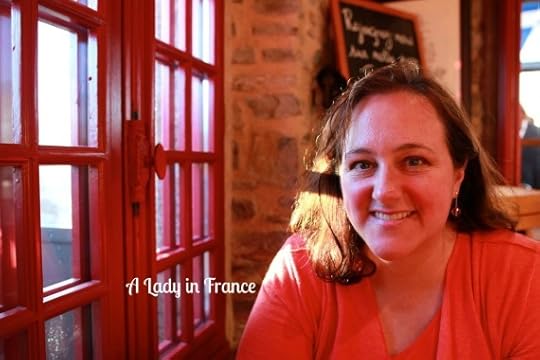
– eating galettes and listening to musicians

– cruising the town and sharing the view with the seagulls

– and watching the sun set here too.

We’re doing the family olympics again this year. Twenty people divided into three teams. It’s just so silly and funny. There are frisbee throws, and obstacle courses, and dancing competitions, and cartwheel races … Fortunately not every person has to participate in every race.
There’s a lot of preparation.
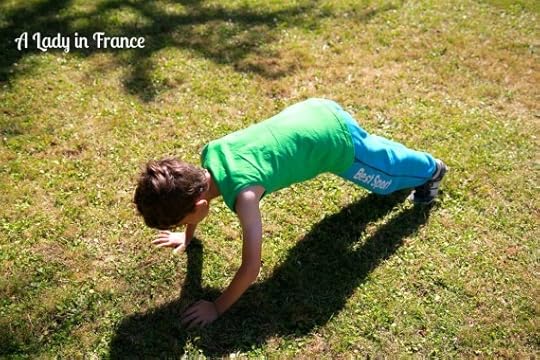
And a lot of laughter and a lot of cheering for the people on the other teams (but we all still want our own team to win). And I think that’s all just kinda cool.
I’m too tired to be clever today, so I’ll just end with a picture from Saint Malo and say bonne soirée.

The post Pictures from Brittany appeared first on A Lady In France.
July 7, 2015
What We’re Doing
We are vacationing in Brittany right now, as we have gotten into the habit of doing for the past eight years.
A photo posted by Jennie Goutet (@aladyinfrance) on Jul 4, 2015 at 2:40am PDT
If you count the grandparents, aunts and uncles, cousins, and us, we are feeding twenty people at each meal. I’ve been recording the food because I thought it would be fun for you to know what the French ate in ordinary settings. (With twenty people). So for the next two Mondays, I will provide you with a ready-made menu, should you wish to eat like the French. (Or eat en masse).
July 2, 2015
Why did God create man knowing we would sin?
This week’s question comes from Melanie‘s son, who wants to know why God would create man knowing we would sin. Here’s what he asked:
Question: “If God knew we’d screw up and have struggles in this world only to fight to get to Heaven and return to Him, why’d He create us at all or why didn’t He just create Heaven and keep us all there? Thirteen-year-old inquiring minds want to know…”

I love your question. It seems illogical, doesn’t it? I mean we love our friends and family, and we even love people we don’t know to some degree. We don’t want them to suffer or be lost, so how could God, who is capable of so much greater love than we are allow even a smidgeon of possibility that someone won’t make it? That they’ll suffer, or be lost?
I really try to answer these #sounddoctrine series through scriptures alone, knowing all the while that the questions will come that simply cannot be answered entirely satisfactorily, because – as Isaiah 58:8 says – “For my thoughts are not your thoughts, neither are your ways my ways,” declares the Lord.
Some things we will only understand fully when we get to heaven.
But I do have a few thoughts in response, based on some scriptures. So let’s start with the first part of your question, why did God bother to create man at all?
Answer: Because he is a Creator. It’s who he is and he can’t deny himself or be something he’s not, or hold back on any of his divine qualities, such as love or creativity –
The Lord loves righteousness and justice;
the earth is full of his unfailing love. Psalm 33:6
Creating is as natural to him as breathing is to us. He created the world to showcase his unfailing love. While the earth was formless and empty, and his Spirit was hovering over the waters, there was no tangible proof of his unfailing love. But once he started creating, there was evidence of his unfailing love in every petal that unfolded, every crimson sunset, every animal that nursed her young, every gust of wind that swept the silver prairie grasses. His unfailing love was everywhere.
So yes, he created the world. But then it was never his intention for the world to remain uninhabited.
he who fashioned and made the earth,
he founded it;
he did not create it to be empty,
but formed it to be inhabited—
he says:
“I am the Lord and there is no other.” Isaiah 45:18
So once the world was in place, and ready for mankind to rule over it, there was nothing left but to introduce man and woman. And there was something special about man and woman that differed from everything else in creation. They were created in God’s image – to be like HIM.
Then God said, “Let us make mankind in our image, in our likeness, so that they may rule over the fish in the sea and the birds in the sky, over the livestock and all the wild animals, and over all the creatures that move along the ground.”
So God created mankind in his own image,
in the image of God he created them;
male and female he created them.
God saw all that he had made, and it was very good. And there was evening, and there was morning—the sixth day. Genesis 1:26 … 29
Even knowing that man would fall, God still said that his creation was very good. There was a precious quality about mankind that God did not breathe into any other creature. And that’s why he created us.
Okay. So if we’re so great, why not send us straight to heaven and skip the painful intermediary step of earth, right? (The second part of your question). Once we’re in heaven, we’d have no choice but to obey God. We would be perfect, and able to say no to sin or anything else that separates us from God.
But you see the problem with that? God already had that kind of creature in his angels. They were servants who had no choice but to obey (after Satan and his angels were thrown down). In speaking of the angels God says,
“He makes his angels winds,
his servants flames of fire.” Hebrews 1:7
He tells his angels to go there and they go there. He commands his angels to wait and they sit still. They are his servants, not his children. He created us for a very different purpose.
For to which of the angels did God ever say,
“You are my Son;
today I have become your Father”?
He also says,
To which of the angels did God ever say,
“Sit at my right hand
until I make your enemies
a footstool for your feet”?
Are not all angels ministering spirits sent to serve those who will inherit salvation? Hebrews 1:5-13 (excerpts)
God already has servants, but he wanted children. And that’s where you and I come in. Now if you can get through this one last scripture in Hebrews 2, which is a little chunky, but nevertheless important, we can head towards a conclusion:
It is not to angels that he has subjected the world to come, about which we are speaking. But there is a place where someone has testified:
“What is mankind that you are mindful of them,
a son of man that you care for him?
You made them a little lower than the angels;
you crowned them with glory and honor
and put everything under their feet.”
In putting everything under them, God left nothing that is not subject to them. Yet at present we do not see everything subject to them. But we do see Jesus, who was made lower than the angels for a little while, now crowned with glory and honor because he suffered death, so that by the grace of God he might taste death for everyone.
In bringing many sons and daughters to glory, it was fitting that God, for whom and through whom everything exists, should make the pioneer of their salvation perfect through what he suffered. Both the one who makes people holy and those who are made holy are of the same family. So Jesus is not ashamed to call them brothers and sisters. Hebrews 2:5-14 (excerpts)
The angels rule and we can’t even see the extent that they rule over. But we can see Jesus, who was made a little lower than the angels until he had died and was resurrected. He was made perfect through his suffering … and so are we. Do you see where this is heading? 
We need the suffering that earth provides in order to be refined and perfected. Without going through the trials earth provides, we would be incomplete – like the butterfly who was kindly “helped” out of his chrysalis and now his wings are not fully formed. And we need the chance that earth provides to choose for ourselves whether or not to follow God.
God already had servants; he wanted children. And in his great love, he made provision for the messy waywardness of children who have the choice to love him back or not. If you remove that choice of free will, you remove the divine quality – the thing that makes us like God.
I think the final aspect of your question contains a little bit of this: what’s so special about messy, wayward children? Aren’t perfect, obedient children so much better?
Well, any parent will tell you that obedient children are certainly nice. But we would never swap a messy wayward child of our own for a perfectly obedient robot. Because when that messy wayward child stops pouting and stamping his feet, or stops running around because there is a fascinating world to explore, or stops focusing on this amazing thing that has caught his attention … and comes to you with a hug, and says, “I love you Mama” – there is no greater surge of love and joy that exists. At least not for a parent. And God just looks and looks, waiting for his children to turn and look back eyes at him.
For the eyes of the Lord range throughout the earth to strengthen those whose hearts are fully committed to him. 2 Chronicles 16:9a
* * *
That was my last question in queue for the moment, so I’ll either take a break for the summer and pick this series back up in the Fall. But if you do have a question to ask me, I would love to hear it. I really do like answering the questions, and appreciate the focus it gives me in my Bible study. If you want to learn more about the series and my qualifications, click here.
The post Why did God create man knowing we would sin? appeared first on A Lady In France.





